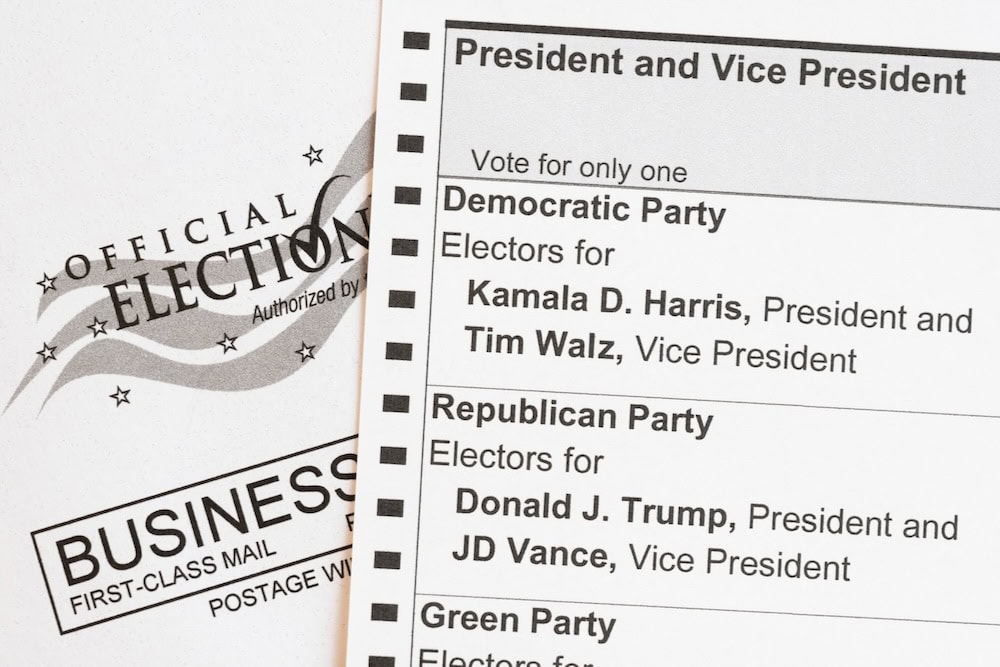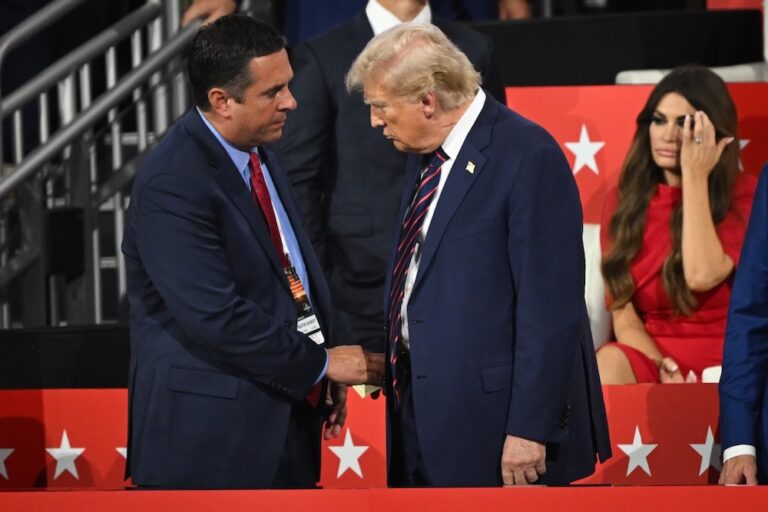The yearslong effort to sow doubt about America's generally free and fair elections poses real risks for the 2024 balloting.
This statement was originally published on freedomhouse.org on 19 September 2024.
The yearslong effort to sow doubt about America’s generally free and fair elections poses real risks for the 2024 balloting. But a growing network of trust-builders aims to restore public confidence and mitigate the threat to US democracy.
Freedom House’s latest assessment of the United States’ vulnerability to digital election interference identifies the spread of false and misleading information about the integrity of American elections as a top risk to watch ahead of the November 5 balloting. The country’s elections are, in fact, generally free and fair. But the persistent effort by former president Trump and his supporters to undermine confidence in the system has contributed to a range of democratic challenges, and has fueled a sizable partisan gap in public trust in elections.
Thankfully, an array of recent initiatives to counter false narratives and build confidence – including and especially on the political right – hold promise for mitigating these threats in the weeks and months ahead. In many cases it is Republican officials at the state and local level who are leading the charge, pushing back against misinformation from within their own party and demonstrating their commitment to America’s democratic process.
How false claims of fraud threaten elections in 2024 and beyond
“Election denialism,” the false belief or narrative that President Joe Biden was not the legitimate winner of the 2020 election, despite the findings of numerous state and federal courts, continues to be promoted by Trump and his supporters, and a majority of Republican voters appear to be persuaded. On top of that disbelief in the 2020 outcome, Trump and his political allies have sought to spread distrust in the election system more broadly, including through false claims about the widespread risk of fraud through mail voting and noncitizen voting. The dissemination and uptake of these and other false narratives pose specific challenges to democracy in this election cycle.
First is the upsurge in harassment and intimidation of election workers since 2020. Nearly 40 percent of local election officials reported experiencing harassment, abuse, or threats related to their work in a spring 2024 survey, with 70 percent reporting an increase in threats since 2020. Beyond the havoc it has wreaked on the lives of innocent public servants, such harassment can contribute to high turnover of experienced personnel, which in turn can increase the risk of real difficulties in election administration.
Partisan meddling in the process of certifying the 2024 election results based on spurious fraud allegations is also a concern. While the Electoral Count Reform Act, passed with bipartisan support in 2022, helped reduce such risks at the presidential level, many are concerned about related risks at the state and local levels. A recent example is an August rule change by Georgia’s election board; critics of the move, including Georgia’s Republican secretary of state, say it could empower politically motivated local election officials to obstruct or delay certification. Election experts differ on how concerned we should be about such threats, particularly given the legal guardrails protecting the certification process. But whether partisan interference attempts ultimately succeed in the courts may be less important than the ways in which they could fuel public confusion and doubt about the elections’ legitimacy.
Misleading election-fraud narratives have been used as pretexts for a raft of recent state-level election policy changes, including stricter mail-voting and identification requirements, that critics claim could restrict voter access this year. Research indicates that such policies have historically had relatively small effects on voter turnout in practice, so voter-access concerns may be overstated. But if the new restrictions are based on false claims about election-security risks, the question remains: why create any potential new barriers to voters’ access to the polls, even minor ones, when there is so little evidence of fraud in the first place?
At worst, of course, election-integrity conspiracism can spill over into actual political violence, as we saw on January 6, 2021. While the hundreds of criminal sentences for January 6 rioters may so far be deterring right-wing groups that are inclined to violence, the threat of similar violence persists -particularly in the event of a Trump loss this year, given that he has again refused to commit to accepting the court-certified results of the coming election.
Looking beyond this election cycle, the continued spread and embedding of false election-integrity narratives may exacerbate the broader democratic challenges America is facing with respect to growing polarization and waning trust in public institutions more generally, which raises the likelihood of future political violence and instability.
The influence of partisanship – and partisan leaders – on public trust in elections
Research has demonstrated that trust in elections tends to depend substantially on whether one’s party won or lost the most recent vote. This is a major challenge, since democracy requires the losing side to accept the people’s decision. But the scale and duration of the “winner-loser” trust gap can be heavily influenced by what political and media elites – especially perceived partisan allies – say about the elections.
This effect has been particularly pronounced in the United States since 2020. While Democrats’ election trust declined after their loss in the 2016 presidential election, it rebounded after the 2018 midterm elections, when Democrats regained control of the House of Representatives. Republicans’ election trust similarly plummeted after their 2020 loss, but it did not recover after the 2022 midterms, despite the fact that Republicans won a new House majority, and it remains low today. This anomaly points to the likely impact of incessant efforts by Trump and Trump-aligned leaders and media influencers to undermine confidence in the system.
Pushing back against the erosion of trust
A range of efforts are underway to address trust-related challenges ahead of the November elections, including cross-sector initiatives in which election officials, law enforcement agencies, legal experts, and others have joined forces to identify and mitigate threats.
Particularly promising, given the importance of signals from fellow partisans in shaping public views, is a growing national network of prominent Republicans who are working to promote trust. One group, loosely coordinated by the R Street Institute and the SNF Agora Institute at John Hopkins University, consists largely of Republican state and local election officials from across the country, including deep-red states like Idaho as well as competitive purple states like Georgia. They have been advocating for a set of confidence-building principles and communications practices among conservatives, calling on them to publicly affirm the integrity of the US election system as a whole, and to characterize policy changes as part of the “continuous improvement” of an already strong system, rather than implying that elections somehow won’t be secure without those changes.
A related state-level effort, RightCount, is building coalitions of community leaders that research indicates are more influential on the political right – like veterans, firefighters, faith leaders, and small-business owners – to reassure concerned voters about the integrity of local elections, counter unfounded claims, and provide support for key officials tasked with certifying elections.
Alongside these right-leaning efforts are a number of initiatives that marshal the influence of leaders from both major parties, such as a bipartisan pledge to uphold democratic values around elections that was signed by more than 700 candidates in the 2022 election cycle, among other important work.
In short, politically influential leaders from across the spectrum – and most critically on the right, where much of America’s election-trust deficit is currently located – are organizing and speaking up to counter years of efforts to undermine public confidence in US elections. Their collective commitment offers hope that more Americans will come to see their election system as the free, fair, and secure institution that it is.



